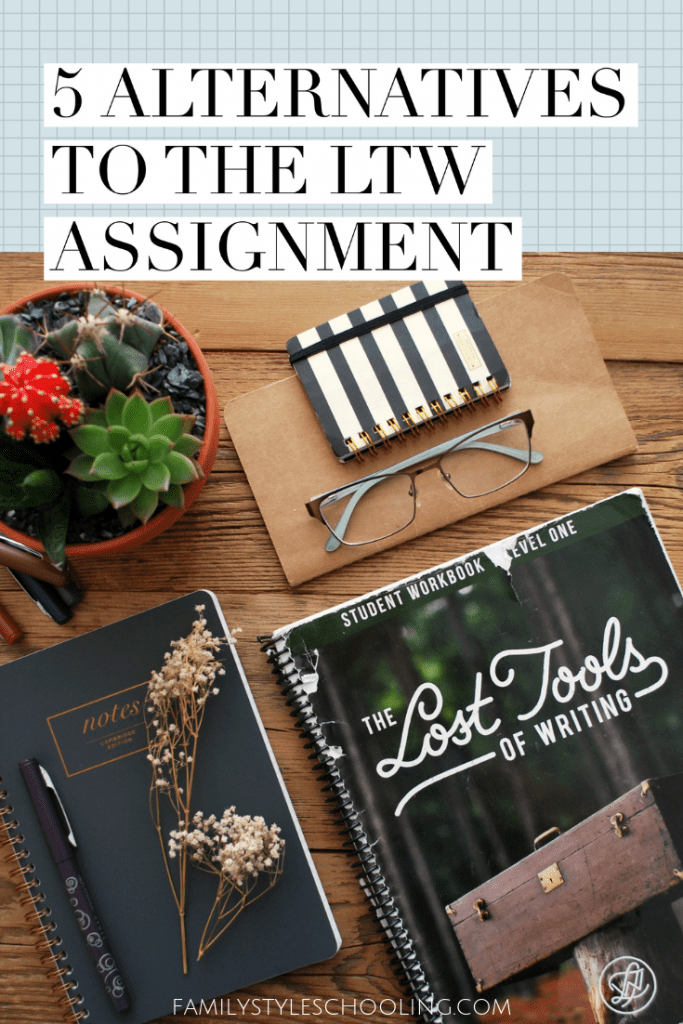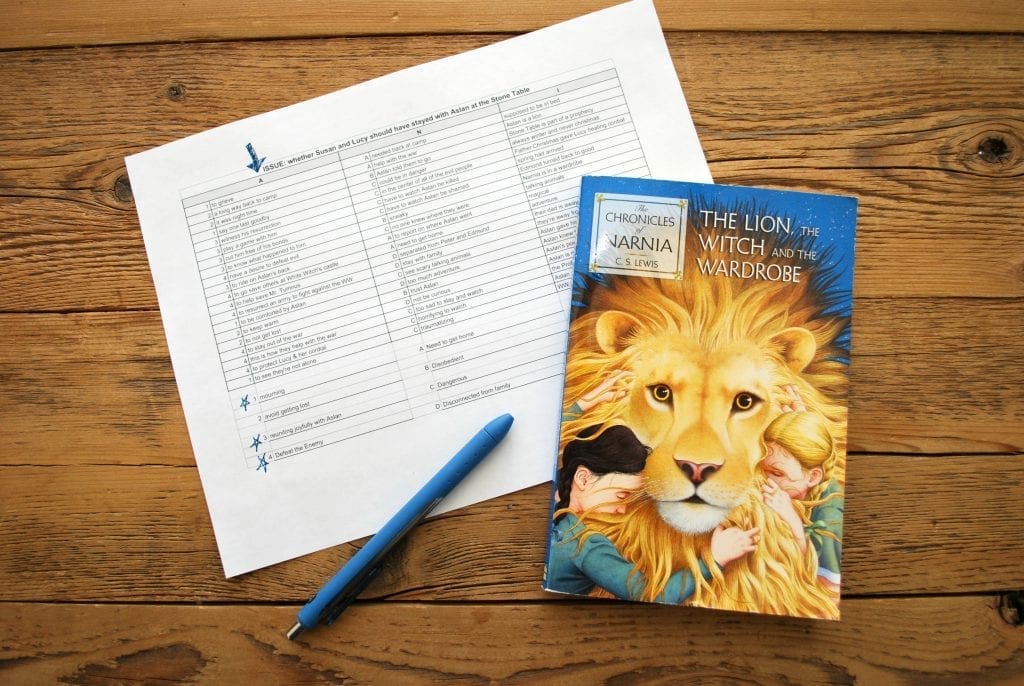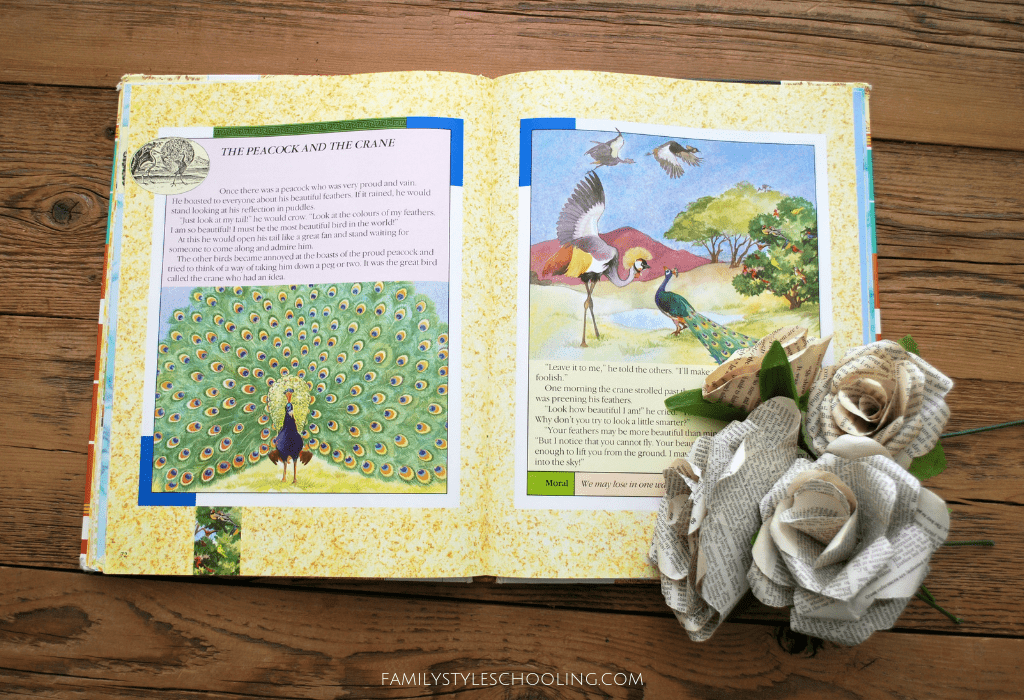5 Alternatives to the LTW Assignment
The Lost Tools of Writing is a big part of the Challenge curriculum of Classical Conversations programs. We work with the tools presented (5 Common Topics) in just about every discussion on community day. I love the way that they cultivate deeper thinking and reasoning.
As the teacher of my homeschool, I love that I have the freedom to adjust assignments when needed. This recently came up when my daughter read a book that she was struggling to develop an issue to consider. In order to continue to cultivate her skills, I gave her five alternatives to the LTW assignment. She still read the book assigned in the guide, but she went a different direction with her paper.

If you find you need to adjust the LTW assignment on a regular basis, you may need to go back and help with the thinking while they're reading. Over the summer, my daughter and I read through most of the books together and took notes. See more about that here. This has helped fill out our ANI charts better than anything I've done before.
If it just happens to be a certain book that doesn't resonate with your student, don't stress! Give them some options like these:
1. Revise an Old LTW Assignment
The first paper of the year was the rudimentary essay. This essay is that basic skeleton that gives students a clear picture of the structure of a persuasive essay. By the end of the year, they've almost made it through the complete persuasive essay, so revisiting an old paper is a great way to see how far they've come.
We used The Lion, The Witch, and The Wardrobe for this rudimentary essay. Since there is so much richness and beauty in this book, it almost seems a shame to not revisit this one. This is actually the option she chose. We used the same issue, but came up with a new ANI chart, which lead to sorting it and deciding to argue the other side of the issue than she first selected.

This is also a great option when life interrupts your schooling. We've had those times when getting everything done is challenging. Heading back to an old paper and adding in the new elements you've learned since then can be a great way to show grace to your student.
2. Use a Bible Story
One of my favorite things to do when introducing parents to the Lost Tools of Writing is discussing a favorite Bible story. I love doing this because it helps reveal at a deeper level why these tools are so powerful.

I think the first time I did this, we discussed whether Moses should have struck the rock. The beauty of this issue is that it only takes a few minutes to read the chapter where you find the issue, so everyone can be on the same page quickly. The other great thing about this is that you can use previous knowledge to help build your ANI. What was happening before? What happened after?
This is a great way to practice cultivating your imagination in connection with the Bible. There is more than one way to study the Bible!
3. Discuss an Aesop's Fable
Remember all of those great Aesop's fables you read when your kids were little? Pull them back off the shelf and use one to lead a great conversation with your student. The story doesn't have to be complex to glean great insights from it.

Using something short and simple can also be a great way to re-infuse confidence in your young writer. If they don't feel overwhelmed and intimidated by the process, they'll become better writers. Sometimes it's good to reduce the resistance to let the concepts settle before you increase the difficulty again.
4. Write a Paper on Your Favorite Book
If you're having a hard time getting your student to fill out their ANI chart, you might consider finding a story that they LOVE to talk about. If they have read it over and over again, they know the details of the story in a deeper way.

You don't want to always make them write persuasive essays on all of their favorite books because you want them to still love reading. However, this can be a great way to meet them where they're at and connecting with them over an assignment they'll love.
5. The Gift of the Magi
One last option to consider is writing an essay on The Gift of the Magi. This short story provides the other sample essay in the LTW guide. It is a classic short story that provides a great debate about wisdom, gift giving, and love.
Having worked through an issue using The Gift of the Magi, students can glean more insight from the sample essays in the back of the guide.

These five alternative options for the LTW assignment aren't the only ways to modify the assignment to meet the needs of your student. However, they can be a great way to keep making progress in developing thinkers that are excited about learning.
Betsy Strauss is an unexpected homeschooler, mother of three, who is in a relationship with a sweet man for life. She loves reading books, drinking coffee, and learning anything with her kids.


Hi! My son’s coop is using this program and Im nervous about doing this with my child who has severe ADHD and high functioning Autism. If I have to sit him down to read, by the time he is done, he is NOT going to want to spend time writing. He has a genius mind but does not enjoy reading or listening to audiobooks much. He LOVES the Bible, poetry, and articles.
Im hoping the teacher of the COOP wont mind my using Bible Stories but I LOVE YOUR IDEA. My hope is to give him very little reading so he can spend more time on the writing.
Any other suggestions?
It sounds like to me that you know your son well! The goal of LTW is to train thinking which leads to good writing, so if you’re not worried about reading comprehension, and you want to focus on strengthening the articulation of his ideas, using sources that inspire him is a great idea! The more you know of LTW the better you will be able to scale it for your son and incorporate it in ways that connect with his learning style. Hope this helps!